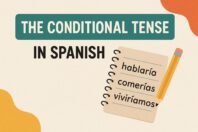Ultimate List: The 45 Most Common Spanish Verbs You Need To Know

Get our free email course, Shortcut to Conversational.
Have conversations faster, understand people when they speak fast, and other tested tips to learn faster.
More infoIn a separate post about the 10 key principles for learning Spanish, we mentioned the 80/20 rule (or Pareto’s Principle, as it’s known) and how you can apply it to learning Spanish.
In you never heard of the 80/20 rule, the idea is that 80% of the results come from 20% of the inputs.
In the context of learning Spanish, you could say that 20% of Spanish verbs are used 80% of the time.
In this post, we will outline the 45 most common and important Spanish verbs that you need to know. For simplicity sake, we are going to list each verb in the simple present tense, but keep in mind that these verbs are as important across all Spanish tenses.
| Spanish verb | English verb | |
| 1. | Estar | To be |
| 2. | Comprar | To buy |
| 3. | Pagar | To pay |
| 4. | Intentar | To try |
| 5. | Cerrar | To close |
| 6. | Hablar | To talk |
| 7. | Caminar | To walk |
| 8. | Necesitar | To need |
| 9. | Buscar | To search |
| 10. | Quedarse | To stay |
| 11. | Jugar | To play |
| 12. | Tocar | To play an instrument or to touch |
| 13. | Viajar | To travel |
| 14. | Trabajar | To work |
| 15. | Amar | To love |
| 16. | Estudiar | To study |
| 17. | Cocinar | To cook |
| 18. | Limpiar | To clean |
| 19. | Guardar | To save |
| 20. | Ahorrar | To save (money) |
| 21. | Perdonar | To forgive |
| 22. | Tomar | To take |
| 23. | Poder | To be able to |
| 24. | Tener | To have |
| 25. | Hacer | To do |
| 26. | Querer | To want |
| 27. | Saber | To know |
| 28. | Poner | To put |
| 29. | Ser | To be |
| 30. | Comer | To eat |
| 31. | Beber | To drink |
| 32. | Ver | To see |
| 33. | Oler | To smell |
| 34. | Leer | To read |
| 35. | Aprender | To learn |
| 36. | Entender | To understand |
| 37. | Ir | To go |
| 38. | Venir | To come |
| 39. | Abrir | To open |
| 40. | Dormir | To sleep |
| 41. | Oír | To hear |
| 42. | Sentir | To feel |
| 43. | Escribir | To write |
| 44. | Vivir | To live |
| 45. | Morir | To die |
As mentioned before, all of these verbs are conjugated in the simple present tense.
Spanish Verbs Ending In AR
1. Estar (to be)
| Personal pronoun | Spanish | English |
| Yo | Estoy | I am |
| Tú | Estás | You are |
| Él | Está | He is |
| Ella | Está | She is |
| Nosotros | Estamos | We are |
| Ustedes | Están | You (plural) are |
| Ellos | Están | They are |
Examples:
- Estamos felices por ti – We are happy for you
- Estoy contigo pase lo que pase – I’m with you no matter what happens
2. Comprar (to buy)
| Personal pronoun | Spanish | English |
| Yo | Compro | I buy |
| Tú | Compras | You buy |
| Él | Compra | He buys |
| Ella | Compra | She buys |
| Nosotros | Compramos | We buy |
| Ustedes | Compran | You (plural) buy |
| Ellos | Compran | They buy |
Examples:
- Ellos compran comida en el supermercado – They buy food in the supermarket
- El mes que viene compramos el carro – Next month we buy the car
3. Pagar (to pay)
| Personal pronoun | Spanish | English |
| Yo | Pago | I pay |
| Tú | Pagas | You pay |
| Él | Paga | He pays |
| Ella | Paga | She pays |
| Nosotros | Pagamos | We pay |
| Ustedes | Pagan | You (plural) pay |
| Ellos | Pagan | They pay |
Examples:
- Yo pago el desayuno – I pay for breakfast
- Carlos paga la renta puntualmente – Carlos pays the rent on time
4. Intentar (to try)
| Personal pronoun | Spanish | English |
| Yo | Intento | I try |
| Tú | Intentas | You try |
| Él | Intenta | He tries |
| Ella | Intenta | She tries |
| Nosotros | Intentamos | We try |
| Ustedes | Intentan | You (plural) try |
| Ellos | Intentan | They try |
Examples:
- Jesús y diego tratan de resolver el problema – Jesus and Diego try to solve the problem
- Él trata de obtener el empleo – He tries to get the job
5. Cerrar (to close)
| Personal pronoun | Spanish | English |
| Yo | Cierro | I close |
| Tú | Cierras | You close |
| Él | Cierra | He closes |
| Ella | Cierra | She closes |
| Nosotros | Cerramos | We close |
| Ustedes | Cierran | You (plural) close |
| Ellos | Cierran | They close |
Examples:
- Ellos cierran la puerta al salir – They close the door when they leave
- Nosotros cerramos el libro al terminar – We close the book when finished
6. Hablar (to talk)
| Personal pronoun | Spanish | English |
| Yo | Hablo | I talk |
| Tú | Hablas | You talk |
| Él | Habla | He talks |
| Ella | Habla | She talks |
| Nosotros | Hablamos | We talk |
| Ustedes | Hablan | You (plural) talk |
| Ellos | Hablan | They talk |
Examples:
- Nosotros hablamos por Internet todos los fines de semana – We talk on the Internet every weekend
- Ellos siempre hablan conmigo – They always talk to me
7. Caminar (to walk)
| Personal pronoun | Spanish | English |
| Yo | Camino | I walk |
| Tú | Caminas | You walk |
| Él | Camina | He walks |
| Ella | Camina | She walks |
| Nosotros | Caminamos | We walk |
| Ustedes | Caminan | You (plural) walk |
| Ellos | Caminan | They walk |
Examples:
- Juan camina al trabajo todos los días – Juan walks to work every day
- Ellos caminan en el parque – They walk in the park
8. Necesitar (to need)
| Personal pronoun | Spanish | English |
| Yo | Necesito | I need |
| Tú | Necesitas | You need |
| Él | Necesita | He needs |
| Ella | Necesita | She needs |
| Nosotros | Necesitamos | We need |
| Ustedes | Necesitan | You (plural) need |
| Ellos | Necesitan | They need |
Examples:
- Ella necesita ayuda – She needs help
- Ustedes no necesitan ir – You do not need to go
9. Buscar (to search)
| Personal pronoun | Spanish | English |
| Yo | Busco | I search |
| Tú | Buscas | You search |
| Él | Busca | He searches |
| Ella | Busca | She searches |
| Nosotros | Buscamos | We search |
| Ustedes | Buscan | You (plural) search |
| Ellos | Buscan | They search |
Examples:
- María busca la dirección en internet – María searches for the address on the internet
- Nosotros buscamos en el diccionario – We search in the dictionary
10. Quedar (to stay)
| Personal pronoun | Spanish | English |
| Yo | Me quedo | I stay |
| Tú | Te quedas | You stay |
| Él | Se queda | He stays |
| Ella | Se queda | She stays |
| Nosotros | Nos quedamos | We stay |
| Ustedes | Se quedan | You (plural) stay |
| Ellos | Se quedan | They stay |
Sidenote: As you can see, this verb looks a bit different, since it may or may not be used as a reflexive verb and each form can change its meaning . In this post, we will use one of its most common meanings, but it can also be used to say something like: “Hoy quedo con Sofia para charlar un poco” – “Today I meet Sofia to chat a little bit”. This use of quedar is more commonly found in Spain, than Latin America.
Examples:
- Nos quedamos aquí hasta mañana – We stay here until tomorrow
- Laura y yo nos quedamos despiertos – Laura and I stay awake
11. Jugar (to play)
| Personal pronoun | Spanish | English |
| Yo | Juego | I play |
| Tú | Juegas | You play |
| Él | Juega | He plays |
| Ella | Juega | She plays |
| Nosotros | Jugamos | We play |
| Ustedes | Juegan | You play |
| Ellos | Juegan | They play |
Examples:
- Tu juegas basquetbol muy bien – You play basketball very well
- Mi familia y yo jugamos cartas los fines de semana – My family and I play cards on weekends
12. Tocar (To play an instrument, or to touch)
| Personal pronoun | Spanish | English |
| Yo | Toco | I play/touch |
| Tú | Tocas | You play/touch |
| Él | Toca | He plays/touches |
| Ella | Toca | She plays/touches |
| Nosotros | Tocamos | We play/touch |
| Ustedes | Tocan | You play/ touch |
| Ellos | Tocan | They play/touch |
Examples:
- Mario y Diana tocan en la orquesta nacional – Mario and Diana play in the national orchestra
- Yo toco guitarra, es mi pasatiempos favorito – I play guitar, is my favorite hobby
13. Viajar (to travel)
| Personal pronoun | Spanish | English |
| Yo | Viajo | I travel |
| Tú | Viajas | You travel |
| Él | Viaja | He travels |
| Ella | Viaja | She travels |
| Nosotros | Viajamos | We travel |
| Ustedes | Viajan | You (plural) travel |
| Ellos | Viajan | They travel |
Examples:
- Ellos no viajan en avión – They do not travel by plane
- Nosotros viajamos en tren, es muy divertido – We travel by train, it’s very fun
14. Trabajar (to work)
| Personal pronoun | Spanish | English |
| Yo | Trabajo | I work |
| Tú | Trabajas | You work |
| Él | Trabaja | He works |
| Ella | Trabaja | She works |
| Nosotros | Trabajamos | We work |
| Ustedes | Trabajan | You work |
| Ellos | Trabajan | They work |
Examples:
- No trabajo los fines de semana – I do not work on weekends
- Tú trabajas en una oficina muy interesante – You work in a very interesting office
15. Amar (to love)
| Personal pronoun | Spanish | English |
| Yo | Amo | I love |
| Tú | Amas | You love |
| Él | Ama | He loves |
| Ella | Ama | She loves |
| Nosotros | Amamos | We love |
| Ustedes | Aman | You (plural) love |
| Ellos | Aman | They love |
Examples:
- Nosotros amamos esa banda – We love that band
- Yo amo ese lugar – I love that place
16. Estudiar (to study)
| Personal pronoun | Spanish | English |
| Yo | Estudio | I study |
| Tú | Estudias | You study |
| Él | Estudia | He studies |
| Ella | Estudia | She studies |
| Nosotros | Estudiamos | We study |
| Ustedes | Estudian | You (plural) study |
| Ellos | Estudian | They study |
Examples:
- Yo estudio español todas las semanas – I study Spanish every week
- Pedro y Ana estudian en la universidad – Pedro and Ana study at the university
17. Cocinar (to cook)
| Personal pronoun | Spanish | English |
| Yo | Cocino | I cook |
| Tú | Cocinas | You cook |
| Él | Cocina | He cooks |
| Ella | Cocina | She cooks |
| Nosotros | Cocinamos | We cook |
| Ustedes | Cocinan | You (plural) cook |
| Ellos | Cocinan | They cook |
Examples:
- Ellos cocinan en el restaurante – They cook in the restaurant
- Ella no cocina muy bien – She doesn’t cook very well
18. Limpiar (to clean)
| Personal pronoun | Spanish | English |
| Yo | Limpio | I clean |
| Tú | Limpias | You clean |
| Él | Limpia | He cleans |
| Ella | Limpia | She cleans |
| Nosotros | Limpiamos | We clean |
| Ustedes | Limpian | You (plural) clean |
| Ellos | Limpian | They clean |
Examples:
- Él limpia su habitación todas las mañanas – He cleans his room every morning
- Si ustedes limpian su habitación pueden salir a jugar – If you clean your room you can go out and play
19. Guardar (to save)
| Personal pronoun | Spanish | English |
| Yo | Guardo | I save |
| Tú | Guardas | You save |
| Él | Guarda | He saves |
| Ella | Guarda | She saves |
| Nosotros | Guardamos | We save |
| Ustedes | Guardan | You (plural) save |
| Ellos | Guardan | They save |
Examples:
- Carlos guarda la comida para mañana – Carlos saves the food for tomorrow
- Ellos guardan el archivo al terminar – They save the file when finished
20. Ahorrar (to save money)
| Personal pronoun | Spanish | English |
| Yo | Ahorro | I save |
| Tú | Ahorras | You save |
| Él | Ahorra | He saves |
| Ella | Ahorra | She saves |
| Nosotros | Ahorramos | We save |
| Ustedes | Ahorran | You (plural) save |
| Ellos | Ahorran | They save |
Examples:
- Yo guardo dinero para mi graduación – I save money for my graduation
- Nosotros guardamos dinero para las vacaciones – We save money for the holidays
21. Perdonar (To forgive)
| Personal pronoun | Spanish | English |
| Yo | Perdono | I forgive |
| Tú | Perdonas | You forgive |
| Él | Perdona | He forgives |
| Ella | Perdona | She forgives |
| Nosotros | Perdonamos | We forgive |
| Ustedes | Perdonan | You (plural) forgive |
| Ellos | Perdonan | They forgive |
Examples:
- Perdonamos todo menos eso – We forgive everything but that
- No te preocupes, te perdono – Do not worry, I forgive you
22. Tomar (to take)
| Personal pronoun | Spanish | English |
| Yo | Tomo | I take |
| Tú | Tomas | You take |
| Él | Toma | He takes |
| Ella | Toma | She takes |
| Nosotros | Tomamos | We take |
| Ustedes | Toman | You (plural) take |
| Ellos | Toman | They take |
Examples:
- Juan toma un taxi al aeropuerto – Juan takes a taxi to the airport
- Nosotros tomamos el examen ahora – We take the exam now
Spanish Verbs Ending In ER
23. Poder (to be able to)
| Personal pronoun | Spanish | English |
| Yo | Puedo | I can |
| Tú | Puedes | You can |
| Él | Puede | He can |
| Ella | Puede | She can |
| Nosotros | Podemos | We can |
| Ustedes | Pueden | You (plural) can |
| Ellos | Pueden | They can |
Examples:
- Daniela y yo podemos venir mañana – Daniela and I can come tomorrow
- No puedes hacer eso – You can not do that
24. Tener (to have)
| Personal pronoun | Spanish | English |
| Yo | Tengo | I have |
| Tú | Tienes | You have |
| Él | Tiene | He has |
| Ella | Tiene | She has |
| Nosotros | Tenemos | We have |
| Ustedes | Tienen | You (plural) have |
| Ellos | Tienen | They have |
Examples:
- No tenemos dinero en casa – We do not have money at home
- Tengo el dinero en el banco, es una precaución – I have the money in the bank, it is a precaution
(related: read our ultimate guide to the Spanish verb Tener)
25. Hacer (To do/make)
| Personal pronoun | Spanish | English |
| Yo | Hago | I do/make |
| Tú | Haces | You do/make |
| Él | Hace | He does/makes |
| Ella | Hace | She does/makes |
| Nosotros | Hacemos | We do/make |
| Ustedes | Hacen | You (plural) do/make |
| Ellos | Hacen | They do/make |
Examples:
- Ustedes hacen ejercicio los domingos – You (plural) exercise on Sundays
- Hacemos más ejercicios? – Do we do more exercises?
26. Querer (to want)
| Personal pronoun | Spanish | English |
| Yo | Quiero | I want |
| Tú | Quieres | You want |
| Él | Quiere | He wants |
| Ella | Quiere | She wants |
| Nosotros | Queremos | We want |
| Ustedes | Quieren | You (plural) want |
| Ellos | Quieren | They want |
Examples:
- No queremos trabajar hoy – We do not want to work today
- Quiero esa comida para mi cumpleaños – I want that food for my birthday
27. Saber (to know)
| Personal pronoun | Spanish | English |
| Yo | Sè | I know |
| Tú | Sabes | You know |
| Él | Sabe | He knows |
| Ella | Sabe | She knows |
| Nosotros | Sabemos | We know |
| Ustedes | Saben | You (plural) know |
| Ellos | Saben | They know |
Examples:
- No sabemos qué hacer – We do not know what to do
- Tu sabes la contraseña de la computadora? – Do you know the password of the computer?
28. Poner (to put)
| Personal pronoun | Spanish | English |
| Yo | Pongo | I put |
| Tú | Pones | You put |
| Él | Pone | He puts |
| Ella | Pone | She puts |
| Nosotros | Ponemos | We put |
| Ustedes | Ponen | You (plural) put |
| Ellos | Ponen | They put |
Examples:
- Yo pongo la música en la reunión – I put the music in the meeting
- Ellos ponen el dinero para los materiales – They put the money for the materials
29. Ser (to be)
| Personal pronoun | Spanish | English |
| Yo | Soy | I am |
| Tú | Eres | You are |
| Él | Es | He is |
| Ella | Es | She is |
| Nosotros | Somos | We are |
| Ustedes | Son | You (plural) are |
| Ellos | Son | They are |
Examples:
- Nosotros somos buenos amigos – We are good friends
- Él es un chico muy inteligente – He is a very smart boy
(related: read our ultimate guide to Ser v Estar here)
30. Comer (to eat)
| Personal pronoun | Spanish | English |
| Yo | Como | I eat |
| Tú | Comes | You eat |
| Él | Come | He eats |
| Ella | Come | She eats |
| Nosotros | Comemos | We eat |
| Ustedes | Comen | You (plural) eat |
| Ellos | Comen | They eat |
Examples:
- Yo como ensalada todos los días – I eat salad every day
- Nosotros comemos de manera saludable – We eat healthily
31. Beber (to drink)
| Personal pronoun | Spanish | English |
| Yo | Bebo | I drink |
| Tú | Bebes | You drink |
| Él | Bebe | He drinks |
| Ella | Bebe | She drinks |
| Nosotros | Bebemos | We drink |
| Ustedes | Beben | You (plural) drink |
| Ellos | Beben | They drink |
Examples:
- Yo bebo vino luego de almorzar – I drink wine after lunch
- Noris y yo bebemos agua en el gimnasio – Noris and I drink water in the gym
32. Ver (to see)
| Personal pronoun | Spanish | English |
| Yo | Veo | I see |
| Tú | Ves | You see |
| Él | Ve | He sees |
| Ella | Ve | She sees |
| Nosotros | Vemos | We see |
| Ustedes | Ven | You (plural) see |
| Ellos | Ven | They see |
Examples:
- Nosotros vemos que podemos hacer – We see what we can do
- Si no lo veo, no lo creo – If I do not see it, I do not believe it
33. Oler (to smell)
| Personal pronoun | Spanish | English |
| Yo | Huelo | I smell |
| Tú | Hueles | You smell |
| Él | Huele | He smells |
| Ella | Huele | She smells |
| Nosotros | Olemos | We smell |
| Ustedes | Huelen | You (plural) smell |
| Ellos | Huelen | They smell |
Examples:
- Tú hueles muy bien – You smell very good
- Nosotros olemos las flores en el jardín – We smell the flowers in the garden
34. Leer (to read)
| Personal pronoun | Spanish | English |
| Yo | Leo | I read |
| Tú | Lees | You read |
| Él | Lee | He reads |
| Ella | Lee | She reads |
| Nosotros | Leemos | We read |
| Ustedes | Leen | You (plural) read |
| Ellos | Leen | They read |
Examples:
- Usted lee muy bien – You read very well
- Ustedes leen el libro para aprender el idioma – You read the book to learn the language
35. Aprender (to learn)
| Personal pronoun | Spanish | English |
| Yo | Aprendo | I learn |
| Tú | Aprendes | You learn |
| Él | Aprende | He learns |
| Ella | Aprende | She learns |
| Nosotros | Aprendemos | We learn |
| Ustedes | Aprenden | You (plural) learn |
| Ellos | Aprenden | They learn |
Examples:
- Ustedes aprenden muy rápido – You learn very fast
- Ella aprende a controlar sus emociones – She learns to control her emotions
36. Entender (to understand)
| Personal pronoun | Spanish | English |
| Yo | Entiendo | I understand |
| Tú | Entiendes | You understand |
| Él | Entiende | He understands |
| Ella | Entiende | She understands |
| Nosotros | Entendemos | We understand |
| Ustedes | Entienden | You (plural) understand |
| Ellos | Entienden | They understand |
Examples:
- Entiendes la lección? – You understand the lesson?
- No entiendo nada, lo siento – I do not understand anything, I’m sorry
Spanish Verbs Ending In IR
37. Ir (to go)
| Personal pronoun | Spanish | English |
| Yo | Voy | I go |
| Tú | Vas | You go |
| Él | Va | He goes |
| Ella | Va | She goes |
| Nosotros | Vamos | We go |
| Ustedes | Van | You (plural) go |
| Ellos | Van | They go |
Examples:
- Ellos van a tu casa en la tarde – They go to your house in the afternoon
- Nosotros vamos a la playa el fin de semana que viene – We go to the beach next weekend
(related: learn our “voy a hack” for speaking in the future using the verb ir)
38. Venir (to come)
| Personal pronoun | Spanish | English |
| Yo | Vengo | I come |
| Tú | Vienes | You come |
| Él | Viene | He comes |
| Ella | Viene | She comes |
| Nosotros | Venimos | We come |
| Ustedes | Vienen | You (plural) come |
| Ellos | Vienen | They come |
Examples:
- José y yo venimos mañana temprano – José and I come early tomorrow
- Ella viene a presentar el examen – She comes to present the exam
39. Abrir (to open)
| Personal pronoun | Spanish | English |
| Yo | Abro | I open |
| Tú | Abres | You open |
| Él | Abre | He opens |
| Ella | Abre | She opens |
| Nosotros | Abrimos | We open |
| Ustedes | Abren | You (plural) open |
| Ellos | Abren | They open |
Examples:
- La tienda no abre los domingos – The store does not open on Sundays
- Ellos abren su negocio – They open their business
40. Dormir (to sleep)
| Personal pronoun | Spanish | English |
| Yo | Duermo | I sleep |
| Tú | Duermes | You sleep |
| Él | Duerme | He sleeps |
| Ella | Duerme | She sleeps |
| Nosotros | Dormimos | We sleep |
| Ustedes | Duermen | You (plural) sleep |
| Ellos | Duermen | They sleep |
Examples:
- Ella duerme ocho horas al día – She sleeps eight hours a day
- Hoy duermo toda la noche, trabajé muy duro – Today i sleep all night, I worked really hard
41. Oír (to hear)
| Personal pronoun | Spanish | English |
| Yo | Oigo | I hear |
| Tú | Oyes | You hear |
| Él | Oye | He hears |
| Ella | Oye | She hears |
| Nosotros | Oímos | We hear |
| Ustedes | Oyen | You (plural) hear |
| Ellos | Oyen | They hear |
Examples:
- Ustedes oyen ese ruido? – Do you hear that noise?
- No oigo muy bien, habla más fuerte por favor – I do not hear very well, speak louder please
42. Sentir (to feel)
| Personal pronoun | Spanish | English |
| Yo | Siento | I feel |
| Tú | Sientes | You feel |
| Él | Siente | He feels |
| Ella | Siente | She feels |
| Nosotros | Sentimos | We feel |
| Ustedes | Sienten | You (plural) feel |
| Ellos | Sienten | They feel |
Example:
- Yo siento que puedo hacerlo – I feel I can do it
- Sientes dolor al caminar? – Do you feel pain when walking?
43. Escribir (to write)
| Personal pronoun | Spanish | English |
| Yo | Escribo | I write |
| Tú | Escribes | You write |
| Él | Escribe | He writes |
| Ella | Escribe | She writes |
| Nosotros | Escribimos | We write |
| Ustedes | Escriben | You write |
| Ellos | Escriben | They write |
Example:
- Quiero escribir un libro – I want to write a book
- Él escribe un libro – He writes a book
44. Vivir (to live)
| Personal pronoun | Spanish | English |
| Yo | Vivo | I live |
| Tú | Vives | You live |
| Él | Vive | He lives |
| Ella | Vive | She lives |
| Nosotros | Vivimos | We live |
| Ustedes | viven | You (plural) live |
| Ellos | Viven | They live |
Example:
- Yo no vivo en esa ciudad – I do not live in that city
- Nosotros vivimos en esa ciudad – We live in that city
45. Morir (to die)
| Personal pronoun | Spanish | English |
| Yo | Muero | I die |
| Tú | Mueres | You die |
| Él | Muere | He dies |
| Ella | Muere | She dies |
| Nosotros | Morimos | We die |
| Ustedes | Mueren | You (plural) die |
| Ellos | Mueren | They die |
Example:
- La planta muere cuando no la riegas – The plant dies when you do not water it
- Muero de ganas de verte – I’m dying to see you







